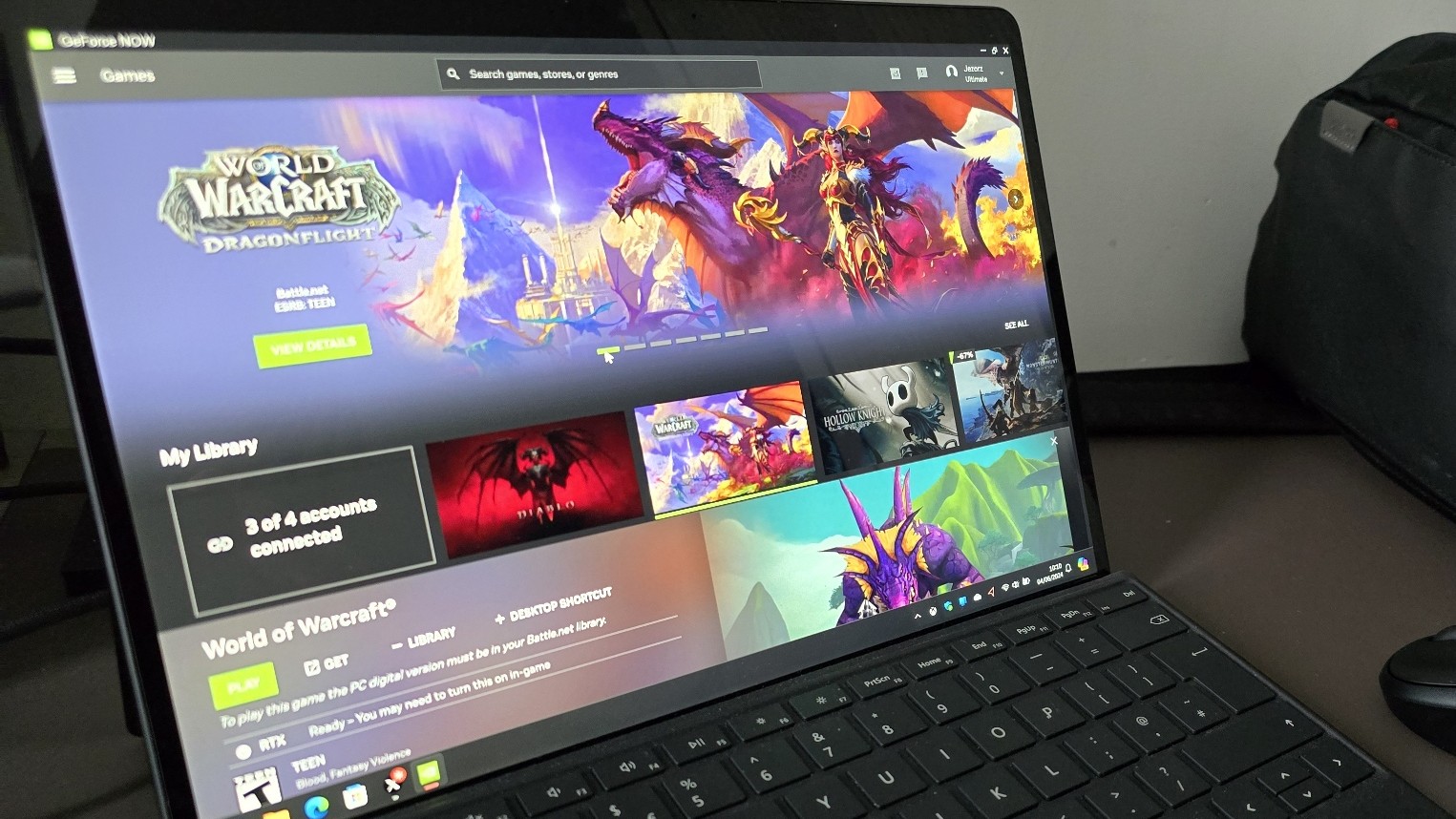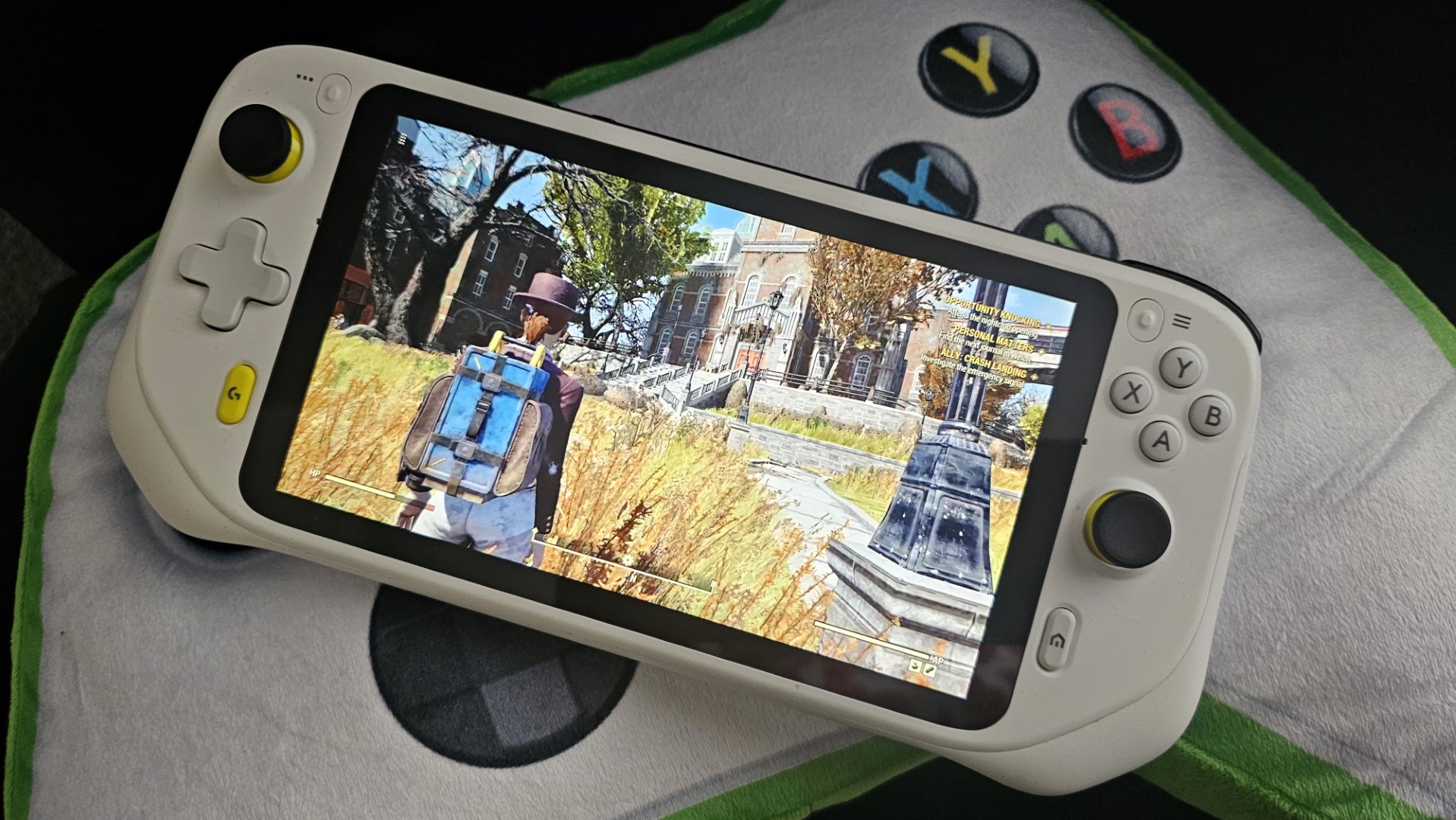
How's NVIDIA GeForce Now doing? Pretty damn well, actually.
This past week, NVIDIA GeForce Now added World of Warcraft to the service, as part of Microsoft honoring its agreement to bring Activision-Blizzard games to competing cloud service platforms. World of Warcraft joins Diablo 4 and other Microsoft games into the service, which differs from Xbox Cloud Gaming in a variety of key ways.
While Xbox's cloud service is powered by repurposed Xbox console hardware, NVIDIA essentially provides virtual machines that run on full-blown Windows. The downside is that you often need to log in and tinker with settings repeatedly on every new virtual machine, the upside is that the cloud servers handle video encoding far better than Xbox's cloud. NVIDIA GeForce Now is often less susceptible to issues stemming from sub-par networking environments, and World of Warcraft proved that to me this week, as I tested it out on very sub-par hotel Wi-Fi.
It made me wonder if Microsoft can realistically catch up to NVIDIA in this space. Xbox definitely has the content, but NVIDIA just feels miles ahead when it comes to actually delivering a "native-feeling" cloud experience even in difficult environments.
World of Warcraft on cloud ... it works!
GeForce NOW allows you to play PC games on Xbox through the Microsoft Edge app! Here’s a video from Reddit user ReapsNoEviL of World of Warcraft being played on Xbox. They say it runs super smooth on ultra settings. #Xbox pic.twitter.com/vmaxXgjrvIJune 1, 2024
So initially, the above tweet from Rebs Gaming started to circulate, forcing me to take a look. I'm currently in LA for Summer Game Fest and Xbox Games Showcase 2024, using an old gen-1 Surface Pro X laptop for word processing and travel. I didn't want to bring my heavy and hulking Razer Blade 16, but I also find myself getting gaming withdrawal symptoms.
The new Surface Pro 11 might be powerful enough to run many lightweight modern games natively, but the Surface Pro X is definitely not, so I wondered to myself if cloud gaming was an option. Then I remembered I'd be on hotel Wi-Fi. The hotel I'm staying in has solid Wi-Fi for basic stuff, giving me around 8-12 Mbps, but it's not something I would've expected to provide a solid gaming experience. NVIDIA proved me wrong. More on that in a minute.
Microsoft has been working with NVIDIA to bring a variety of its games to NVIDIA GeForce Now in recent months. You might think it's odd, given that NVIDIA and Microsoft are essentially competitors in cloud gaming, but NVIDIA only provides the platform here. All the in-app purchases, and game purchases, still go to Microsoft, Steam, or whatever platform is tied to the service. NVIDIA is acting as a middle man essentially, and there's no effective downside to Microsoft to support NVIDIA here, at least in the short term. Long term, NVIDIA could rug pull and start charging if their cloud somehow became the defacto way people want to game, but that's not exactly likely until the longer term, particularly given how expensive and niche this tech is right now. The important thing is that, right now, it does work, and it works incredibly well.
As you can see from Rebs Gaming's video above, Microsoft has also worked with Edge engineers on the Xbox app to improve its efficiency. The last time I tried NVIDIA GeForce Now via the Edge browser on Xbox it straight up didn't work due to lag. Browser tabs would crash, and inputs wouldn't register, if you could even get a game running. It seems Xbox has improved how Edge runs now, because World of Warcraft has become completely viable to play this way, which is impressive. There does seem to be some caveats, though.
... with caveats!
Convinced NVIDIA GeForce Now is dark magic. This is on VERY sketchy 8 Mbps hotel WiFi on Surface Pro X (Windows on Arm, old version). World of Warcraft cloud. SO cool. Picture quality suffers at this speed (JPEG-y), but responsiveness again feels almost native. #NVIDIAGFN… pic.twitter.com/u6qvFR8rgxJune 1, 2024
World of Warcraft is quite a complex game with a big 20-year established history behind it. The game is also heavily designed around modding tools, with higher-end content experiences effectively designed with the expectation that players will use some form of "boss mods" to give extra warnings and timers about upcoming dangerous attacks. Played via the cloud, you will have limited access to these types of things at best, given that once your session closes out, your virtual PC is effectively wiped clean. The fact the virtual machine is also wiped clean means you have to sign in every time you want to play, which is also a bit annoying.
So, no boss mods. No mods at all, actually. WoW is quite fine to play without these mods if you're particularly well-learned, for sure. I suspect a lot of players use them as a crutch and they're not necessarily needed outside the absolutely most cutting-edge Mythic content the game has to offer. WoW has greatly improved its basic UI in recent years, making it a solid experience without mods.
The other caveat, however, seems to be that the game breaks whenever WoW gets an update, and WoW sure does get a lot of updates. Ahead of writing this article today, I planned to play it a bit more in the cloud and do some more serious content, but the game simply crashes when I open it now, after taking a small hotfix patch Blizzard deployed the other day. Clearly, there are some kinks to work out, but the core point is that it works, and it works incredibly well. Even on my very limited hotel Wi-Fi, I was getting close to a native experience. GeForce Now crushes the image quality to preserve responsiveness, and it wasn't long before I simply forgot I was playing via the cloud. Sadly, I can scarcely say the same for Xbox and Microsoft's solution via Xbox Game Pass in this same setup.
Can Xbox play catch up here?

Just to test how Xbox Cloud Gaming would stack up against NVIDIA GeForce Now in this rather sub-optimal, challenging network environment, it was simply night and day. Xbox is night, in this scenario. I tried DOOM 64 on the same Wi-Fi, and the experience was just impossible. Constant Star Wars-like screen wipes prevented play, bursts of unresponsiveness made it difficult to control. Xbox Cloud Gaming is totally solid on a powerful network set-up, though, but NVIDIA GeForce Now just seems miles ahead in sub-optimal conditions, and many millions of people don't exactly have the best home set-ups for Wi-Fi, whether due to location or basic things like home structural issues. European homes often have incredibly thick walls that make Wi-Fi signals sketchy, and NVIDIA's tech seems far better at navigating these hurdles than Xbox's solution. Xbox Cloud Gaming often works best in the home, where many are likely to have a native option anyway. At least for me, cloud gaming shines in scenarios like this when I'm going on the road, and that's ironically where cloud provision is often the weakest.
There are many barriers to the general adoption of cloud gaming, of course. Whether it's the prohibitive cost and energy consumption on the platform holder's side, closed ecosystems blocking business models on Apple and Google's end, or simple geographical restrictions. Cloud gaming definitely has its work cut out. When it does work, and it is available, it's awesome. And Microsoft has said it's seeing "double-digit" growth in cloud gaming services, potentially proving that there's something here down the line, as tech improves. Our sources have hinted to us that Xbox Cloud Gaming "bring your own games" to the service could also arrive as soon as July, opening up the service far beyond the Xbox Game Pass catalog. Xbox definitely has NVIDIA beat on content, particularly for Xbox users, but can Xbox's platform cloud tech ever hold up to NVIDIA's? Will Microsoft be happier simply providing the content for others to lock down the technological aspects? It certainly remains to be seen.







